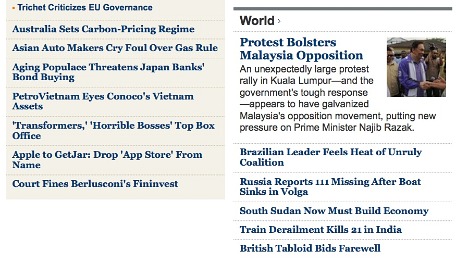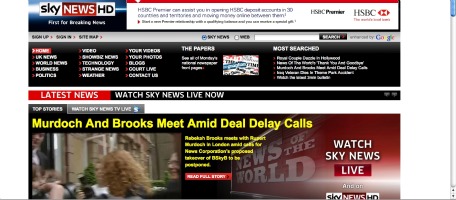It’s been hard to watch The Wall Street Journal, still the global business-news leader, struggling with both hands tied behind its back to cover the incredible scandal now engulfing its parent.
The News of the World debacle—a five-alarm business story if there ever was one—is the acid test of my old paper’s independence. Of course, it’s not going well. This is a story it should be leading on, and, but for a certain feckless family that decided to go for the gold a few years ago, it would be.
If the phone-hacking scandal at the WSJ’s erstwhile sister paper (how does that sound?) was only about an *entire newsroom* gone out-of-control—paying cops for scoops, hacking phones of missing children and dead soldiers’ families—that in itself is flood-the-zone material.
But then its media parent just up and closes the thing down after 168 years? Just shutters it, tossing 2.6 million readers to the four winds?
We’re looking at a story that not only exposed rampant corruption and cover-ups at the highest levels of London’s Metropolitan police and ties between media executives and high government officials; this story hasn’t just jeopardized a crucially important merger; it has shaken the British government, and threatens the inner circle one of the world’s most powerful and influential media companies.
Indeed, the story is creeping toward U.S. shores and the CEO of Dow Jones, Les Hinton. (If you want to know what’s happening, obviously go to the Guardian.)
The Journal‘s aversion to this story has been clear for a couple of years now. After the Guardian uncorked one of its more explosive stories back in 2009—that News Corp. executives had being buying the silence of hacking victims—the Journal offered only “British Tabloids Face Scrutiny By Government on Privacy Issues”. No, these were your British tabloids (the other named was the Sun, another WSJ, um, sister paper.
Last week, when the Guardian‘s Milly Dowler blockbuster tore open the story yet again, Ryan Chittum noted that the paper gave it all of 349 words under the headline “U.K. Tabloid Accused of Hacking Girl’s Phone.” Oh, those pesky U.K. tabloids.
By Wednesday—after the news dam had broken, and we learned that families of terror attacks and dead soldiers had been hacked, the prime minister’s former press secretary had approved bribes to police, etc., etc. (round up here)—the Journal had mustered a story onto B1. Chittum called it a fair story, fairly reported. Okay. And on Friday, the story made page one: “Tabloid to Close Amid Scandal.” We should be grateful, I suppose, but that day, it was literally impossible to keep the story off the front page.
Then, a lost weekend.
In my Saturday print edition, the paper puts stories—well executed, but basic—on page A9. Sorry, no.
And on Sunday, well the story didn’t even get a decent burial.
And here’s what the WSJ’s U.S. home page looked liked most of the day (this around 6 p.m).

The link, by the way, was to an AP wire story, later upgraded.
Here’s what Sky News had at the same time:

World War III. That news operation is still 61 percent independent. See the difference, you British regulators over there?
And no, this is not just a media story, journos writing about other journos. It’s not just a U.K. story, if that’s what senior editors believe. No way.
Remember, this is an editorial leadership that, as we’ve noted, has decided to set the staff chasing scoops, where even seconds count, like there’s no tomorrow. It live-blogs the opening ceremonies of the Winter Olympics, with seven reporters no less.
Indeed, in the past, some of the most incisive stories about News Corp. were published by none other than The Wall Street Journal, most famously in 2000, a devastating page-one story on how Wendi Deng got to be Mrs. Murdoch* (no link available for now; I’ll try to find one. Jack Shafer discussed the story back in 2007).
The NotW coverage is so obviously hamstrung, and far, far below the paper’s true capacity. That’s too bad. I know that more coverage is planned. Perhaps there’s a leder in the works.
But the larger point is inescapable: News Corp. is a bad home for the world’s leading monitor of markets, the economy, and corporate behavior. It always was.
If you say, hey, you know, Dow Jones never covered its own problems, most notably the business debacle that was Telerate (backgrounder here). I say, that’s true, and also bad. It’s just that Dow Jones as a company didn’t matter that much, and the worst crime it could be accused of was shooting itself in the foot, which it certainly did, repeatedly.
Back in the day, I argued back that News Corp. couldn’t cover the U.S. business story because one of the meta stories of our age is the overweening clout large economic actors have gained over regulators and government itself. I said back then that News Corp. represents that story in a metaphoric sense.
Now, it’s the story, period. Imagine trying to cover it from the inside out.
* “Meet Wendi Deng: The Boss’s Wife Has Influence at News Corp.—Murdoch Spouse, 31, Has Come A Long Way Since Leaving China a Dozen Years Ago—A Yale Connection in Beijing.”
Dean Starkman Dean Starkman runs The Audit, CJR’s business section, and is the author of The Watchdog That Didn’t Bark: The Financial Crisis and the Disappearance of Investigative Journalism (Columbia University Press, January 2014). Follow Dean on Twitter: @deanstarkman.
